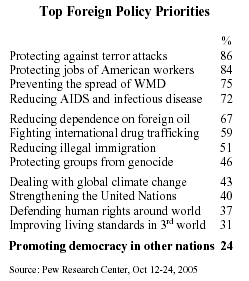by Andrew Kohut
When President Bush delivered a strong warning against isolationism in Tuesday’s State of the Union address, he was speaking to a recent and dramatic turn in public opinion. A recent Pew Research survey found a decided revival of isolationist sentiment among the public, to levels not seen since post-Cold War 1990s and the post-Vietnam 1970s. Moreover, one of the main pillars of Bush’s argument in favor of global engagement – the need to promote democracy around the world – has not struck a chord with the public. Support for that objective has been consistently tepid, even among members of Bush’s own party.
“Our enemies and our friends can be certain the United States will not retreat from the world, and we will never surrender to evil. America rejects the false comfort of isolationism.” (George W. Bush, 2006 State of the Union address)
A major Pew survey in October showed that a growing number of Americans feel the United States “should mind its own business internationally and let other countries get along the best they can on their own.” Fully 42% expressed that view, up 12 points in just three years. In more than 40 years of polling only in 1976 and 1995 did public opinion tilt this far toward isolationism.
Views about global engagement are deeply intertwined with partisanship, though the relationship has shifted over time. Currently, Democrats are twice as likely as Republicans to say the U.S. should mind its own business internationally and not worry about other countries, and Democrats also are more apt to say we should “concentrate more on our own national problems” and not think so much in international terms. But this has not always been the case. Throughout the Clinton administration Republicans were just as skeptical about U.S. foreign involvements as were Democrats. Even on the eve of the Sept. 11 attacks, an equal share of Republicans and Democrats favored withdrawing from world affairs. It is only in the years since that Republicans have shifted their viewpoint and supported a more engaged foreign policy. And it is only since the war in Iraq that Democrats have moved in the other direction.
“At the start of 2006, more than half the people of our world live in democratic nations. And we do not forget the other half…because the demands of justice, and the peace of this world require their freedom as well.”
 While Bush has championed an active foreign policy agenda, he has failed to rally the nation, Democrats and Republicans alike, behind his goal of spreading democracy around the world. Of thirteen foreign policy priorities tested in Pew’s October survey, “promoting democracy in other nations” came in dead last, rated as a top priority by fewer than one-in-four Americans. Despite its lowest favorability rating in two decades, more Americans see strengthening the United Nations as a top priority than promoting democracy. And in contrast with public opinion on most foreign policy questions these days, there is no partisan divide – Republicans and Democrats agree that this goal should not be a major foreign policy priority.
While Bush has championed an active foreign policy agenda, he has failed to rally the nation, Democrats and Republicans alike, behind his goal of spreading democracy around the world. Of thirteen foreign policy priorities tested in Pew’s October survey, “promoting democracy in other nations” came in dead last, rated as a top priority by fewer than one-in-four Americans. Despite its lowest favorability rating in two decades, more Americans see strengthening the United Nations as a top priority than promoting democracy. And in contrast with public opinion on most foreign policy questions these days, there is no partisan divide – Republicans and Democrats agree that this goal should not be a major foreign policy priority.
One reason for this is that the public is broadly skeptical that it will be possible for Bush to succeed in spreading democracy, especially in the Middle East. Just a third (34%) say Bush’s calls for greater democracy in the region are a good idea that will succeed; 36% think it is a good idea that will not succeed; and 22% believe it is a bad idea.
“In a time of testing, we cannot find security by abandoning our commitments and retreating within our borders.”
Despite the rise in isolationist sentiment, this remains a minority viewpoint with the public. Moreover, 84% of Americans say it is important that the partnership between the U.S. and Western Europe remain close, and majorities continue to reject the idea that America can afford to ignore world opinion or turn away from world affairs. Most still say the U.S. should cooperate fully with the United Nations, despite widespread dissatisfaction with the institution. And just over half say the preemptive use of military force against those who threaten the U.S. can at least sometimes be justified.
Rather, the current isolationist mood is a direct reflection of public doubts about Iraq, including the decision to go to war, the ongoing violence there, and the impact on America’s status in the world. Fully 71% say the Iraq war is a major reason that people around the world are unhappy with the U.S. And just 16% – the fewest in over a decade – are satisfied with the way things are going in the world. Under different circumstances, Americans may well support an ambitious approach to foreign policy, whether in response to a humanitarian crisis (such as the 2004 tsunami) or a military threat (such as Iran’s nuclear program). In the coming years, both circumstances and leadership will play a large role in shaping the public’s willingness to engage in the world.


